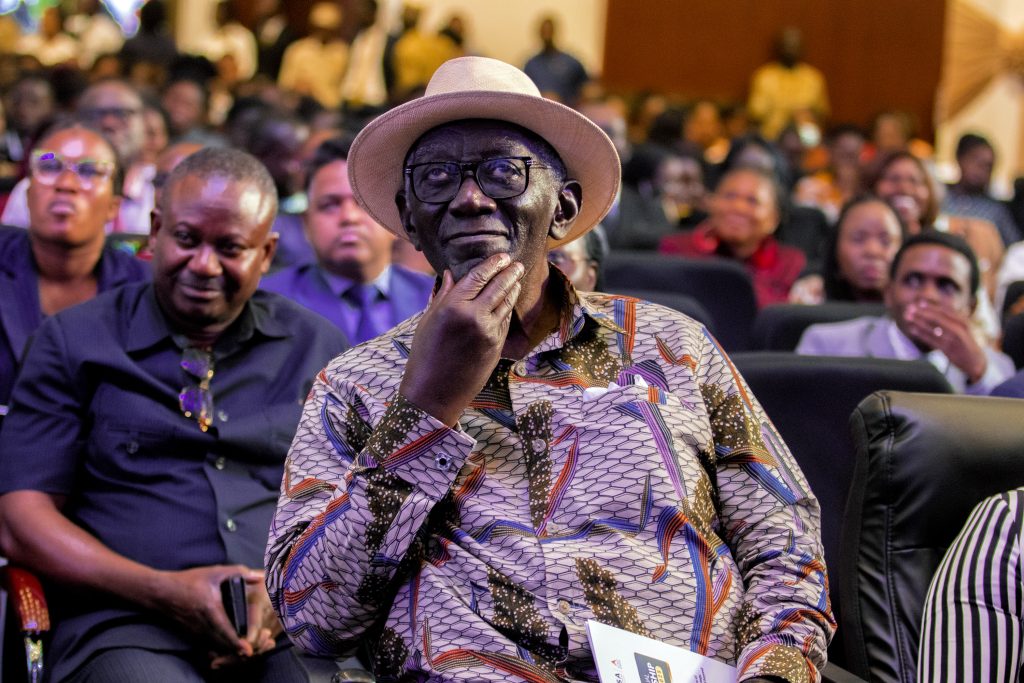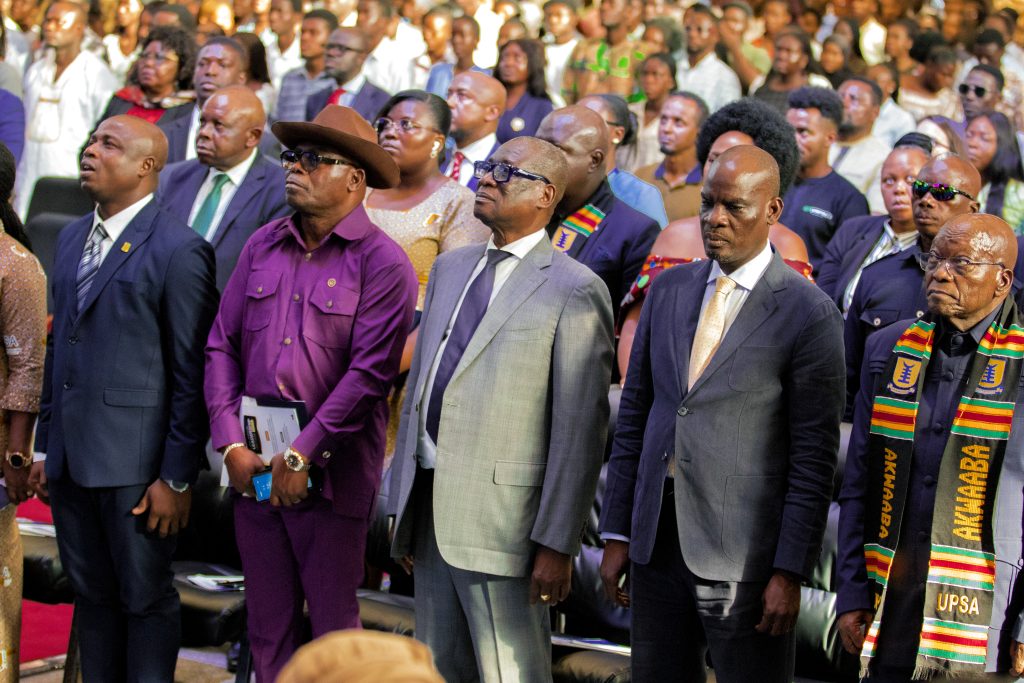On Tuesday, August 19, 2025, the University of Professional Studies, Accra (UPSA) once again cemented its reputation as a hub of intellectual engagement when it hosted the 6th edition of its Annual Leadership Lecture. The event, held at the Kofi Ohene-Konadu Auditorium, brought together a distinguished array of leaders, policymakers, academics, diplomats, students, and members of the business community to deliberate on one of the most pressing issues of our time: Africa’s economic sovereignty in a rapidly changing global order.
The theme for the lecture — “Geopolitics and Geo-economics of De-dollarisation: BRICS Currency Strategy, Lessons for Africa’s Common Currency and Beyond” — could not have been more timely. It reflected both the urgency and complexity of the continent’s struggle for economic independence in an international system still dominated by the U.S. dollar.
Read the full report on Geopolitics and Geo-economics of De-dollarisation: BRICS currency strategy, Lessons for Africa’s Common Currency and Beyond
The audience included His Excellency John Agyekum Kufuor, former President of Ghana; Honourable Haruna Iddrisu, Ghana’s Minister for Education and Special Guest of Honour; Members of Parliament; Vice Chancellors of sister universities; members of the UPSA Governing Council; leaders of industry; and the media. Adding continental weight to the conversation was the presence of former South African President Jacob Zuma, whose political career and advocacy for Africa’s stronger role in global governance added resonance to the day’s discussions.


The Vice Chancellor’s Call for Bold Leadership
The event was officially opened by Professor John Kwaku Mensah Mawutor, the Vice Chancellor of UPSA, who assumed office earlier this year. In his address, he set the tone for the day’s deliberations by underscoring UPSA’s mission not only as an academic institution, but as a driver of thought leadership on Africa’s development challenges.
Tracing the institution’s evolution from its humble beginnings as the Institute of Professional Studies in 1965 to its present status as a fully-fledged university, Professor Mawutor highlighted the strides UPSA has made in providing world-class academic programmes and producing graduates who can compete on any stage.
He emphasised that Africa’s universities must serve not only as centres of knowledge, but as incubators of solutions to the continent’s greatest challenges. “These are turbulent times,” he noted, “marked by post-COVID recovery, global conflicts, climate crises, and economic uncertainty. They demand a new kind of leadership — leadership that inspires trust, drives innovation, and positions Africa at the centre of global discourse.”
His remarks were met with enthusiastic applause, as students and dignitaries alike were reminded of the broader vision that drives the Annual Leadership Lecture series.
Haruna Iddrisu: Confronting Africa’s Economic Paradox
As Special Guest of Honour, Honourable Haruna Iddrisu delivered a stirring message that captured both the frustrations and hopes of Africa’s economic journey. He painted a vivid picture of the contradictions in Africa’s natural resource endowment, asking:
“How come cocoa producers import expensive chocolate? How can cobalt producers import expensive batteries? How come sugarcane producers import expensive sugar? And how come gold producers import expensive jewelry?”
The Minister’s words struck a deep chord with the audience. In those questions lay the painful reality of a continent rich in resources, yet struggling to transform that wealth into prosperity for its people.
He argued that Africa’s over-reliance on the U.S. dollar has come at a heavy cost — undermining the continent’s ability to chart an independent economic path. He further noted that building strong systems for intra-African trade and strengthening local currencies could unlock transformative growth, adding that the future of Africa lies not in dependence, but in self-determination.
“Africa must move beyond being a supplier of raw materials,” he said, “and become a producer of finished goods, a trader with itself, and a driver of its own destiny.”
Jacob Zuma’s Reflections on Continental Sovereignty
While not the official keynote speaker, the presence of Jacob Zuma, former President of South Africa, brought an added layer of significance to the lecture. Zuma, who has long been an advocate for Africa’s deeper engagement in global alliances such as BRICS, offered reflections on the shifting dynamics of world economics and what they mean for Africa.
He reminded the audience that BRICS was founded to challenge the monopoly of Western economic dominance, and that Africa must be proactive in positioning itself within such platforms. Zuma warned that without deliberate steps to embrace de-dollarisation and economic realignment, Africa would continue to remain at the mercy of external forces despite its vast wealth.
His remarks, delivered with the authority of someone who has lived through the highs and lows of African politics, left the auditorium charged with a sense of urgency. For many in the audience, Zuma’s reflections served as both a caution and a call to action: Africa cannot wait for others to define its place in the global economy.
A Tradition of Thought Leadership
The UPSA Annual Leadership Lecture has, since its inception in 2017, carved a niche as a premier platform for discussing leadership challenges across politics, business, and society. Over the years, it has hosted statesmen such as President John Agyekum Kufuor, Otumfuo Osei Tutu II, and Cardinal Peter Turkson.
This year’s edition built on that legacy, reinforcing UPSA’s role as not just an academic institution, but a leader in national and continental dialogue. The atmosphere in the Kofi Ohene-Konadu Auditorium reflected the weight of the theme, with participants engaging deeply in the ideas presented and students inspired to envision their role in Africa’s unfolding story.
Gratitude to Partners
In keeping with tradition, the university expressed profound gratitude to its partners and sponsors. Zenith Bank was acknowledged for its generous financial support. Media General and Metro TV were praised for amplifying the conversation to national and international audiences. Labadi Beach Hotel was lauded for providing logistical support and hospitality, ensuring the seamless execution of the event.
Such partnerships, the university noted, are essential in sustaining platforms like the Annual Leadership Lecture, which bridge academia, policy, and industry.
Conclusion: Charting a Bold Future
As the curtains fell on the 6th UPSA Annual Leadership Lecture, one message resounded: Africa’s destiny lies in its own hands. From the Vice Chancellor’s call for bold leadership, through Haruna Iddrisu’s challenge to confront the continent’s economic paradox, to Jacob Zuma’s reflections on continental sovereignty, the day’s deliberations painted a clear picture of the task ahead.
Africa must rise to lead not just in rhetoric but in action — by controlling its resources, building resilient economies, trading more within itself, and creating systems that reflect its aspirations.
The Annual Leadership Lecture thus reaffirmed UPSA’s central role in convening the conversations that matter. And as participants left the auditorium, they carried with them not just ideas, but a vision of a continent determined to break free from old patterns and chart a new economic destiny.


